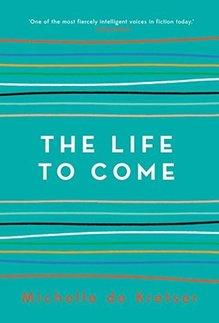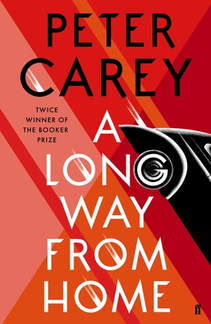The Life to Come by Michelle de Krester
Of all the characters, Pippa is among the most self-deluded, and Michelle de Krester seems to have fun showing her from the perspectives of her friends and acquaintances. Although narcissistic, she is pleasant and sociable; the kind of person who might appear, initially, attractive as a friend. Her neighbour, Christabel, lonely after retirement and the death of her housemate, certainly warms to her, so is dreadfully hurt to find herself unattractively portrayed as a minor character in Pippa’s breakthrough novel.
Michelle de Krester does loneliness magnificently, not only in Christabel but in the more worldly Celeste, whom Pippa befriends in Paris. Celeste believes she’s content to have renounced material wealth to live where and how she pleases, until her brother and his snooty wife arrive from Australia. Most poignant is the realisation that her once-a-week liaison could never mean as much to her married lover as it does to her. Thanks to Atlantic Books for my advance proof copy. For a couple of other novels about writers, see this post from November.
A Long Way from Home by Peter Carey
Willie Bachhuber is the Bobs’ next-door neighbour. Having abandoned his wife after she gave birth to a baby whose skin son suggests Willie is not the father, and suspended from his teaching post for his unusual punishment of a pupil who called him a “kraut”, Willie spends his time studying maps and winning prizes on a popular radio quiz show, anticipating the day the show will attract sufficient sponsorship to allow him to cash in the cheques. When his quiz show rival, and erstwhile girlfriend, finally beats him and he’s ousted from the show, it makes perfect sense for him to serve as the Bobs’ navigator on the Redex.
I didn’t expect I’d rave about a novel featuring an eighteen-day road rally. But then Peter Carey’s twentieth book is about a lot more than cars. Although the Holden team have no time for sightseeing on that dusty and dangerous circumnavigation of Australia, they do get to learn a lot about their country. Pardon the pun, but the road trip is the vehicle for a story about race.
Set a century after Salt Creek, which tells the story of the whitefella’s takeover of aboriginal lands, A Long Way from Home shows the depressing consequences of ignorance for one group and poverty for the other (actually several aboriginal cultures treated as if their differences don’t matter). The cruelty and foolishness of the apartheid system is exposed: not only in the limits to freedom of movement but also in the removal of lighter skinned indigenous children from their mothers.
Admiring the light touch with which Peter Carey leads the reader towards these dark and painful moral issues, I’ve had a stab at analysing how he does it in the hope of it rubbing off on my own writing. The novel bursts to life in the first sentence as Irene introduces herself and her situation in a sparky – but not showy – voice. She reveals herself in relation to others: her family of origin, her husband, and her battle with her father-in-law. After six pages, Willie takes over, in all his flawed confusion until, quite quickly, the neighbours meet. The voices alternate, a relationship developing, but both also facing their own triumphs and trials as, in the course of 140 pages, the cogs are in place for both the surface story (the road rally, a fairly straightforward quest) and the deeper story of the shameful treatment of Australia’s indigenous people who might never see the inside of a car, never mind drive one. As the cultural strand develops, the story of the rally fades into the background; the novel becomes structurally unbalanced towards the end with the introduction of two new points of view, but I was enjoying the story too much to complain. To summarise, there’s a sequence of hooks: voice, character, relationships, quest, theme. If only it were that simple!
Thanks to Faber and Faber for my review copy. For my thoughts on Peter Carey’s previous novel, Amnesia, see my post Political shenanigans in Australia.























 RSS Feed
RSS Feed





















